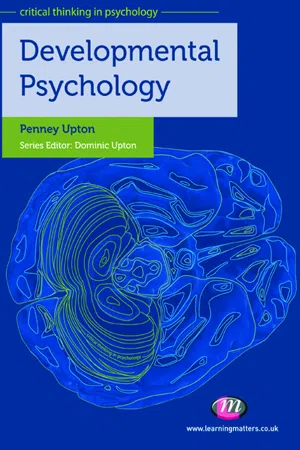Psychology
Developmental Research
Developmental research in psychology focuses on studying human growth and change over time, from infancy through adulthood. It aims to understand the physical, cognitive, emotional, and social development that occurs at different life stages. Researchers use various methods, such as longitudinal and cross-sectional studies, to investigate how individuals develop and the factors that influence their development.
Written by Perlego with AI-assistance
Related key terms
8 Key excerpts on "Developmental Research"
- Nancy Fenton, Jessica Flitter(Authors)
- 2015(Publication Date)
- Research & Education Association(Publisher)
Chapter 11 Developmental PsychologyDevelopmental psychology focuses on the physical, cognitive, social, and moral development of humans that occurs across the lifespan from conception to death. Typically developmental psychologists examine these various changes at distinct periods in life, in particular, prenatal and newborn, childhood, adolescence, and adulthood. Developmental psychologists are ultimately attempting to answer questions about how we become who we are and how much of whom we are is related to nature and how much is influenced by nurture. In regard to developmental psychology, the term nature specifically references influences on development that are genetic or biological. Aspects of developmental change influenced by nature are often related to the process of maturation. Maturation includes the biological growth processes that enable changes in behavior. These growth processes are connected to an individual’s genetic blueprint, meaning that they are relatively uninfluenced by experience. The term nurture involves the influence of environmental factors on development, such as family, nutrition, culture, interactions with others, education, wealth, etc. Developmental psychologists agree that both nature and nurture contribute to physical, cognitive, social, and moral development in people.STUDY TIPBe able to describe how nature and nurture influence physical, cognitive, social, and moral development.Developmental Research MethodsDevelopmental psychologists seek to understand how individuals develop over time and determine whether differences among age groups are related to changes in cognitive, emotional, or behavioral abilities; for example, if older children can remember longer lists of words than younger children. Because age cannot be manipulated (individuals cannot be randomly assigned to a particular age group), Developmental Research is often correlational.- eBook - ePub
- Thomas Keenan, Subhadra Evans, Kevin Crowley(Authors)
- 2016(Publication Date)
- SAGE Publications Ltd(Publisher)
The world abounds with budding psychologists. The fact that you are sitting down right now reading this text suggests that you may be one yourself. At the least, you are likely to be interested in understanding yourself or any number of other people, including your parents, siblings, friends or even children in general. How can we best gain insight into our own and our family members’ past actions and predict their future behaviour, emotions and cognitions? The field of psychology, in general, and developmental psychology, in particular, is concerned with these very questions. We hope, through reading and studying this text, you will gain greater awareness of a number of important psychological questions, including how we develop and grow as a fetus from the very beginning, to how children learn about moral behaviour, and what happens when things go wrong with typical development. As you will discover, there are still many unanswered questions, but we are increasingly expanding on the knowledge of previous generations of psychologists. Perhaps you will become one of the very scientists working so hard to fill in the gaps of our knowledge about human development.Life-span developmental psychology is the field of psychology which involves the examination of both constancy and change in human behaviour across the entire life span, that is, from conception to death (Baltes, 1987). Table 1.1 below shows the age periods that child development is typically divided into. Developmental psychologists are concerned with diverse issues, ranging from the growth of motor skills in the infant to the gains and losses observed in the intellectual functioning of the elderly. The goal of study in developmental psychology is to further our knowledge about how development evolves over the life span, developing a knowledge of the general principles of development and the differences and similarities in development across individuals. The range of topics comprising the study of modern psychology is vast, and encompasses sub-areas as diverse as social psychology, comparative psychology, the study of learning, neuropsychology, abnormal psychology, and cognitive psychology. However, the study of development is possible within each of these areas. Thus, in one sense, developmental psychology can be thought of as an approach that one takes to the broader study of psychology (Buss, 1995).This text focuses on a relatively narrow portion of the life span, specifically the time development between conception and adolescence. This area of study is known as the study of child development - eBook - ePub
Topics in the History of Psychology
Volume II
- G. A. Kimble, K. Schlesinger(Authors)
- 2014(Publication Date)
- Psychology Press(Publisher)
The final omission from our history is the wealth of recent writing on the history of childhood itself, which describes historical changes in popular conceptions of the child and in the treatment of children by parents, educators, and government officials (Aries, 1962; Borstelmann, 1977; Bremner, Barnard, Hareven, & Mennel, 1970–1974; de Mause, 1974). There is also documentation of changes in the popular advice on childrearing given to parents over the years (e.g., Stendler, 1950; Wolfenstein, 1953).Examination of the great amount of material just mentioned could allow some future historian to better explain historical changes in the field of developmental psychology, and also document the impact of developmental psychology on other fields and the society at large. Though our goal of describing theory and research in developmental psychology is more limited, it is a necessary part of the larger task.DEVELOPMENTAL PSYCHOLOGY: DEFINITION AND ISSUESThe field that today is called developmental psychology has gone under other names. At the beginning it was commonly known as “child psychology.” This label accurately reflects an early concentration on the child per se, rather than on changes with age from infancy through childhood and adulthood. A shift to the designation of the field as “child development” can be rather arbitrarily set at 1934, the data of the founding of the Society for Research in Child Development. This name indicates a heightened interest in developmental processes, but a continued emphasis on the child. The change to the label “developmental psychology” can again be rather arbitrarily set at 1954, when Division 7 of the American Psychological Association was renamed the Division of Developmental Psychology. The new label represents an implicit broadening of the field to include human development through the life span as well as the development of other species, but also a narrower focus on exclusively psychological phenomena.The newer labels, child development and developmental psychology, can occasionally be found in early writings in the field. Moreover, an examination of the titles of major journals in the field will establish that the name “child psychology” has not been entirely abandoned. However, the concept of development is certainly crucial to the present definition, and many different types of evidence show that it has become more important to the field as the years have passed. - eBook - ePub
- Penney Upton(Author)
- 2011(Publication Date)
- Learning Matters(Publisher)
Chapter 7 , for example, we see the way in which cognitive skills can continue to increase in adulthood or decline depending on personal experiences. Developmental psychology informs several applied fields, including educational psychology, child clinical psychology and child forensic psychology, and also complements the other main fields in psychology, including social, cognitive and individual differences.Themes in developmental psychology
There are a number of themes that run right through developmental psychology. These are:- the influence of nature verses nurture;
- continuity versus discontinuity in change;
- critical versus sensitive periods of development;
- stability versus change;
- the role of the individual in development.
Nature versus nurture
As a student of psychology you will come across the nature–nurture debate throughout your studies. It is one of the most fundamental and oldest issues in psychology and philosophy, and one that we will return to in later chapters. The debate concerns the relative contributions of inheritance and the environment in determining our knowledge and behaviour. Philosophers such as Plato and Descartes supported the idea that we are born with knowledge and innate skills. Other thinkers such as John Locke argued for the concept of tabula rasa – the idea that the mind is a blank slate at birth, with experience determining what we know. These philosophical viewpoints have influenced some of the great thinkers in developmental psychology as you will see later on in the chapter.In developmental psychology the debate centres around two main questions.- Are children born with innate knowledge or skills or are these acquired from interaction with the environment?
- Is development driven by external factors or by something inside each individual?
In this context, nature refers to traits, abilities and capacities that are inherited. It includes anything produced by the predetermined unfolding of genetic information. Development that relies on nature alone is known as maturation - eBook - ePub
The Psychological Development of Girls and Women
Rethinking change in time
- Sheila Greene(Author)
- 2014(Publication Date)
- Routledge(Publisher)
He is at heart a cheerleader for the view of development as progress. A very basic question that persists is the extent to which the whole notion of development and thus, perhaps, the use of the word'development', provides an inappropriate metaphor for describing human psychological change across the life course and the person's relationship with time, age and ageing. It is useful to remind oneseli of the etymology of the word development. The Shorter Oxford Dictionary gives the primary definition of develop as 'To unfold, unroll, to unfurl'. Development is defined as 'A gradual unfolding, a fuller working out of the details of anything'. As applied to psychological development, the notion of unfolding or realization of latent or inherent potential has been fundamental to the usage of this word and to the thinking of developmental psychologists. The idea of development was a powerful concept at the end of the nineteenth century and was a core principle in the biological sciences but also in social sciences such as history and economics. Morss (1990) makes a strong case that developmental psychology is permeated with biological thinking, largely expressed in the adherence to the development metaphor. From this point of view, developmentalism can be defined as a commitment to the view that psychological change is to a large degree biologically determined, natural, universal, predictable and in the process of moving towards a final definable endpoint. This is not the understanding of development that I wish to promote in this book. I will argue for a view of development as constrained rather than determined, emergent not given, historically and culturally contingent not universal, more constructed than natural (in the traditional sense in which natural has been used). However, I will use the term development, since it maps onto the subject matter of this book, if not the assumptions traditionally associated with its use - eBook - ePub
- Irving B. Weiner, Richard M. Lerner, M. Ann Easterbrooks, Jayanthi Mistry(Authors)
- 2012(Publication Date)
- Wiley(Publisher)
The consistency across chapters in the demonstration of the usefulness of relational developmental systems thinking for theory, research, and application indicates that this frame for contemporary developmental scholarship is not tied necessarily to a particular content domain, but rather is useful for understanding the broader developmental system within which all dimensions of individual development emerge (e.g., Ford & Lerner, 1992; Gottlieb, 1998; Overton, 2010; Sameroff, 2009; Thelen & Smith, 2006). In other words, although particular empirical issues or substantive topics (e.g., perceptual development, successful aging, cognition and achievement, emotional behaviors, or complex social relationships) may lend themselves readily as emphases of developmental scholarship within or across developmental periods, the chapters in this volume attest to the importance of focusing on relational, integrative individual-context dynamics to understand the human developmental system.Conclusions
The power of contemporary developmental science scholarship lies in its integrative character—across substantive domains of individual functioning (e.g., biology, emotional, cognition, and social behaviors), across developmental periods, across levels of organization (from biology through culture and history), and across basic and applied interests in regard to understanding and enhancing human life. As represented by the scholarship in this volume, contemporary developmental science is not limited by (or, perhaps better, confounded by) an inextricable association with a unidimensional portrayal of the developing person (e.g., the person seen from the vantage point of only cognitions, emotions, or stimulus-response connections). Today, the developing person is neither biologized, psychologized, nor sociologized. Rather, the individual is systemized; that is, his or her development is conceptualized and studied as embedded within an integrated, relational matrix of variables derived from multiple levels of organization.This relational approach to developmental science is certainly more complex than its organismic or mechanistic predecessors (Lerner, 2006; Overton, 2010; Overton & Müller, this volume). However, a relational developmental systems approach is also more nuanced, more flexible, more balanced, and less susceptible to extravagant or even absurd claims (e.g., that nature, split from nurture, can shape the course of human development). Moreover, as elegantly demonstrated by the chapters in this volume, relational developmental systems offer a productive frame for rigorous and important scholarship about the process of human development and applications across the life span. Together, these advances in the scholarship of knowledge generation and knowledge application serve as an invaluable means for advancing science and service pertinent to people across the breadth of their lives. Ultimately, then, such applications of developmental science may contribute to the enhancement of social justice (Lerner & Overton, 2008). - eBook - ePub
Psychology at Iowa
Centennial Essays
- Joan H. Cantor(Author)
- 2013(Publication Date)
- Psychology Press(Publisher)
In another sense, this research paved the way for the fourth phase of developmental psychology by demonstrating that learning depends, in an important way, on the developmental status of the subject. Developmental status in this usage refers to both phylogeny and ontogeny. In the developmental phase one seeks developmental facts, or better yet, discovers developmental laws, and formulates developmental theories to explain them.What do I mean by development? To cite Ernest Nagel, another distinguished philosopher of science, development—as used in the life sciences—refers to long-term, permanent, sequential changes in the structure or function of the organism. These changes result in novel outcomes for the individual, outcomes that increase one’s capacity for self-regulation. Deterministic explanations of developmental changes are expected to be found in some alteration in the developing organism, or in the environment, or most likely, both (Nagel, 1957). Environment in this context is broadly conceived to range from the cellular to the social surround. Developmental changes in the structure and function of the brain, as manifested in both ontogeny and phylogeny, provide suitable examples.My point is that, if there is to be a separate, mature discipline called developmental psychology, it will be because there are separate, basic, developmental laws to be discovered and explained. Let it be understood, however, that developmental laws do not replace general-process laws; they supplement them, just as the laws of genetics supplement the general laws of biology. This is the message of my retrospective review.Now to the influence of Iowa on myself personally. I came to Iowa as a graduate student in 1940 eager to learn more about psychological theory. I chose Iowa for three reasons. I wanted to do graduate work with Lewin because my undergraduate training was Gestalt-oriented. Iowa was relatively inexpensive, an important consideration because the country was then in the midst of the Great Depression. Last but not least, the decision was made jointly with a fellow undergraduate named Howard Kendler. - eBook - ePub
- Eliot Hearst(Author)
- 2019(Publication Date)
- Routledge(Publisher)
11 Developmental PsychologyRobert B. CairnsPeter A. OrnsteinUniversity of North Carolina at Chapel HillI. INTRODUCTION
At the end of experimental psychology’s first century, its relationship to the concept of development seems as remote and clouded as at the beginning.1 The most scholarly history of the science provides only few clues on the matter; neither development nor ontogenesis (nor synonyms for these concepts) appear in the otherwise extensive index of Boring’s (1950) classic History of Experimental Psychology. Perhaps the omissions should not come as a surprise: The origins of consciousness or behavior were not central issues for Wundt or his immediate successors. The “new psychology” was concerned with a structural analysis of consciousness, not with its development and functions. However, an evaluation of the historical evidence indicates that developmental ideas have at times played a critical role in the establishment of theoretical and research themes in experimental psychology. Indeed, if the “functional psychology” and behaviorism that emerged after Wundt’s structuralism had followed in the footsteps of “functional biology,” the issues of development would have been given the highest priority in the young science.1 We must first clarify what this chapter is a history of. Developmental psychology is concerned with the study of the origins, maintenance, and changes in behavior and cognition. The field thus encompasses much but not all of the work and thinking of psychologists who study young children and persons at maturity and in old age, as well as the whole “life span.” To the extent that these matters are studied in nonhuman organisms—in their embryonic, postnatal, and adult stages—they have been seen as falling within the domain of developmental psychology.For some, they were stressed. J. B. Watson, in defining the scope and limits of his version of the new psychology, substituted a “stream of activity” for William James’ “stream of consciousness.” Watson (1926) provided a “complete life chart—of the ceaseless stream of activity beginning when the egg is fertilized and ever becoming more complex as age increases [p. 33].” Referring to one such chart of activity, Watson concluded:
Learn about this page
Index pages curate the most relevant extracts from our library of academic textbooks. They’ve been created using an in-house natural language model (NLM), each adding context and meaning to key research topics.







